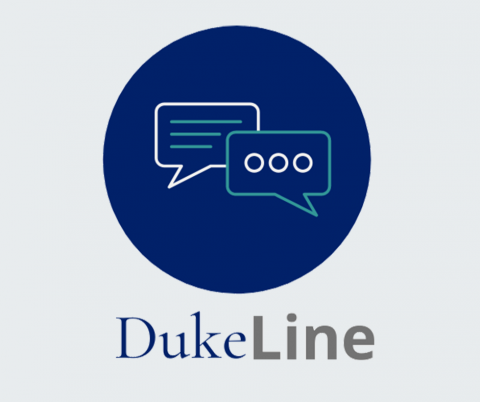DukeLine: Peer Mental Health Support for Graduate Students (2021-2022)
Over the past five years, college mental health centers around the country have experienced a surge in demand, without a commensurate surge in resources. Notwithstanding limits of access, there are significant barriers to seeking mental health services – particularly for graduate students – including time and financial constraints as well as fear of mental health-related stigma. Yet many colleges and universities are not able to accommodate the growing demand for mental health supports on their campuses.
Peer support programs have been shown to be effective in improving a number of student outcomes including mental health, but these programs are seldom used with graduate students. Thus, peer support programs may be one solution to increase access to supportive services for students while eliminating barriers.
Launched as a pilot among selected undergraduates in Fall 2020, DukeLine is an anonymous peer text-line that aims to provide emotional and mental health support to Duke undergraduates. In the 2021-2022 academic year, the DukeLine team collected data from current and former Duke undergraduate users to evaluate service feedback and, as a result, help improve the service. Additionally, the team collected data on graduate students' mental health needs to determine if DukeLine would be an efficient service to broaden to other types of students.
Learn more about this project team by viewing the team's video.
Timing
Summer 2021 – Summer 2022
Team Outputs
Peer Mental Health Support for Duke Students (2022 Fortin Foundation Bass Connections Virtual Showcase)
DukeLine: A Peer to Peer Support Program (poster by Savannah Erwin, Talita Ahmed , David Goldston, Guillermo Sapiro, Timothy Strauman,, Sue Wasiolek, Sarah Gaither , Nancy Zucker, Katherine Buchholz, Jacqueline Cruz, Elizabeth Davidson, Evan Dragich, Faith Joo, Aspen Martin, Leslie Leal Palacios, Camden Nelson, Elizabeth Roy and Kashyap Sreeram, presented at Fortin Foundation Bass Connections Showcase, Duke University, April 13, 2022)
This Team in the News
Duke Students Share Support Through Textline
Students Support Each Other’s Mental Health, One Text at a Time
This project team was originally part of the Education & Human Development theme of Bass Connections, which ended in 2022. See earlier related team, Peer Coaches: Improving Mental Health Treatment for College Students (2020-2021).
Image: DukeLine logo, courtesy of DukeLine website

Team Leaders
- Talita Ahmed, Arts & Sciences-Psychology and Neuroscience
- Savannah Erwin, Arts and Sciences–Psychology and Neuroscience–Ph.D. Student
- Sarah Gaither, Arts & Sciences-Psychology and Neuroscience
- Guillermo Sapiro, Pratt School of Engineering-Electrical & Computer Engineering
- Nancy Zucker, School of Medicine-Psychiatry and Behavioral Sciences
/undergraduate Team Members
-
Christine Barrett, Psychology (AB)
-
Katherine Buchholz, Psychology (AB)
-
Jacqueline Cruz, Computer Science (BS)
-
Elizabeth Davidson, Biology (BS)
-
Evan Dragich, Psychology (BS)
-
Kash Sreeram, Program II (BS)
-
Faith Joo, Psychology (BS)
-
Leslie Leal Palacios, Neuroscience (BS)
-
Nayoon Lee, Economics (BS)
-
Aspen Martin, Psychology (BS)
-
Camden Nelson, Biology (BS)
-
Elizabeth Roy, Psychology (BS)
/yfaculty/staff Team Members
-
Sue Wasiolek, Student Affairs
-
Thomas Szigethy, Student Affairs
-
Timothy Strauman, Arts & Sciences-Psychology and Neuroscience
-
Amy Powell, Student Affairs
-
David Goldston, School of Medicine-Psychiatry and Behavioral Sciences
-
Gary Bennett, Arts & Sciences-Psychology and Neuroscience
/zcommunity Team Members
-
Orange County Rape Crisis Center
-
iCarol
